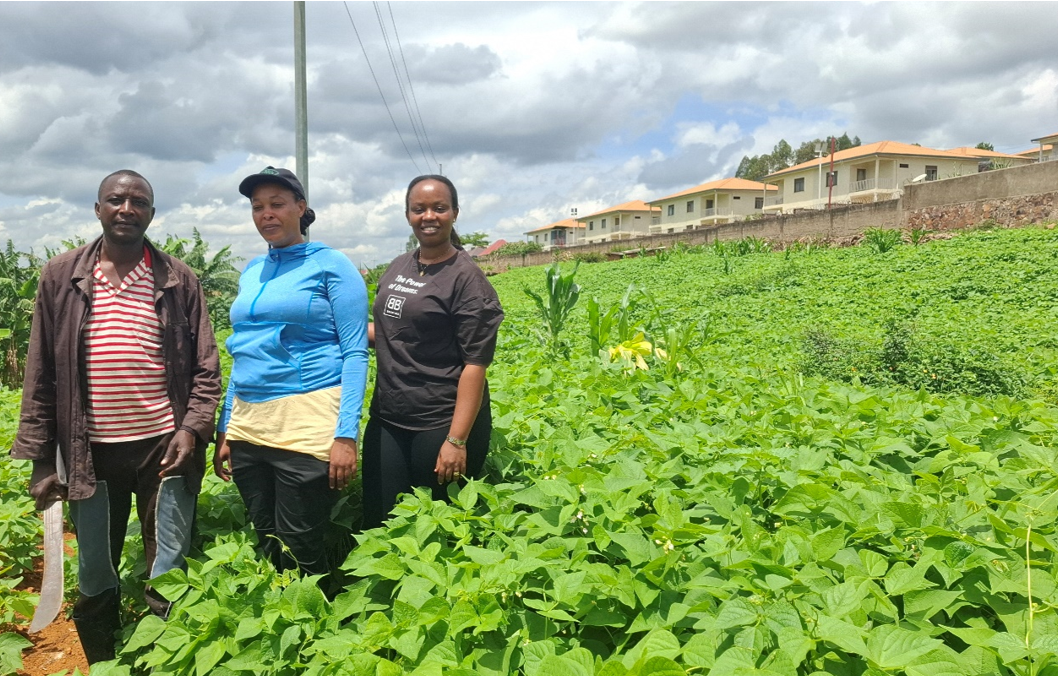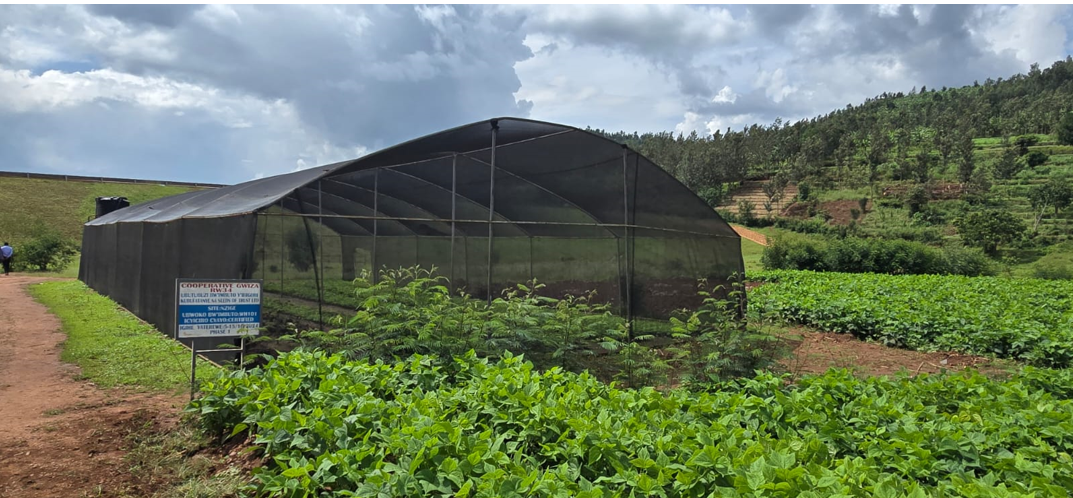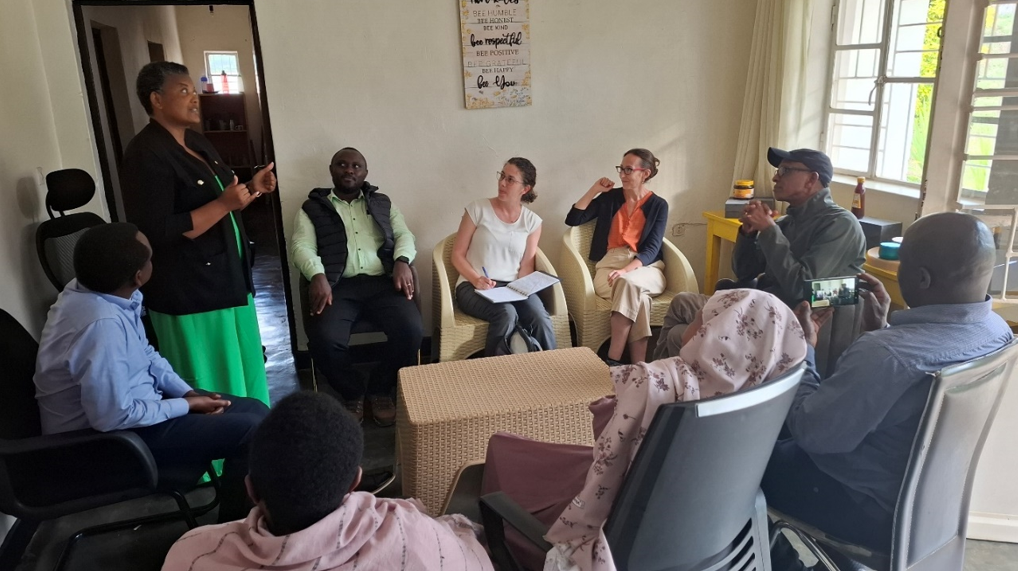By Yvonne Munyangeri, Warren Arinaitwe, Eliud Birachi, Jean Claude Rubyogo (Alliance of Bioversity International and CIAT); Ayuka Fombong, Nelly Ndungu, Faris Samira Mohamed (icipe); Edouard Rurangwa, Athanase Hategekimana (RAB-Rwanda)
In the heart of Africa, on the rolling hills of Rwanda, smallholder farmers are learning not just to weather the storm—but to thrive through it. In a country where agriculture contributed 26% of GDP in the 2023/2024 fiscal year[1], resilience is not a luxury—it’s a necessity. Known as the “Land of a Thousand Hills,” Rwanda relies heavily on its agriculture sector, with beans at the center of it all. With 79.9% of households farming them and an unmatched global per capita consumption of 32.9 kg per year, beans are not just a staple, they are the backbone of national nutrition. They contribute 15.6% of dietary energy and 30.4% of national protein intake. Yet, in 2023 alone, environmental challenges such as floods, droughts, pests, and diseases led to an 18% reduction in bean yields.
To protect and enhance the resilience of this essential crop, Rwanda has prioritized beans in its Fifth Strategic Plan for Agriculture Transformation (PSTA5)[2]. But beans are not the only part of the equation. Fruit trees and beekeeping are increasingly recognized as critical to rural resilience. Fruit trees—mango, papaya, avocado—are multifunctional: they nourish, generate income, provide fuelwood and fodder, combat soil erosion, and contribute to climate change adaptation. In response, the Ministry of Agriculture and Animal Resources (MINAGRI) launched campaigns under both PSTA4 and PSTA5 to promote the planting of five fruit trees per household and school. Yet adoption remains low due to challenges in production skills, climate variability, and insufficient policy and investment support.
Beekeeping, too, holds promise. Despite its relatively underdeveloped state, Rwanda’s honey sector supports rural and peri-urban livelihoods and promotes biodiversity. However, with only 31% of beehives being modern and limited technical know-how, the full potential of this sector remains untapped.
Strengthening value chains through BRAINS
To tackle these interconnected challenges, the Building Equitable Climate-Resilient African Bean and Insect Sectors (BRAINS) Project, supported by the Government of Canada and implemented by the Alliance of Bioversity International and CIAT through the Pan-Africa Bean Research Alliance (PABRA) and the International Centre of Insect Physiology and Ecology (icipe), is stepping in. Active across 15 African countries including Rwanda, BRAINS is investing in building capacity across bean, fruit tree, and honey value chains, focusing on the smallholder farmers who are most vulnerable to climate and market risks.
On April 30, 2025, Canada’s High Commissioner to Rwanda, Julie Crowley, along with Claude Landry of the Pan Africa Regional Development Program, in the company of implementing partners visited local cooperatives to see firsthand how the BRAINS initiative is creating change from the ground up.
Urban farming with high-iron beans in Kigali
In the Rubirizi wetland of Kigali, the visiting team met with Abanyamurava Cooperative, a group of ten women and two men farming two hectares of high-iron beans. Through a partnership with the women-led Aggregator Trust Ltd., the cooperative has received training in improved agronomic practices and access to nutrient-rich varieties like NUA566 and RWR 3195.
“These women were planting local varieties with low yields. We introduced them to improved beans, organized them into a formal cooperative, and linked them with banks for financing,” explained Ms. Safina Mukagatera, Managing Director of Aggregator Trust Ltd.
Cooperative leader Ms. Zaninka Claudine shared her optimism: “We’ve applied everything we learned. Our yields will be better, and the market is already secured thanks to our aggregator.”
Scaling up in Rwamagana
In the Nzige wetland of Rwamagana, the Gwiza RW-34 Cooperative, comprising over 600 members (including 304 women and 108 youth), is farming 10 hectares of high-iron beans, alongside mangoes, avocados, and papayas. In collaboration with Seeds of Trust Ltd., the cooperative has benefited from contracts that provide high-quality seed and a guaranteed buyer.
“I trained them before giving out seeds because I want quality produce,” said George Ngarambe, Founder of Seeds of Trust Ltd. “We signed contracts to ensure they get good prices while we get reliable supply.”
Fidele, Gwiza RW-34’s leader, praised the improvements: “We’re now harvesting 1.2 tons per hectare—much more than before. Today’s visit will also help strengthen our beekeeping skills.”
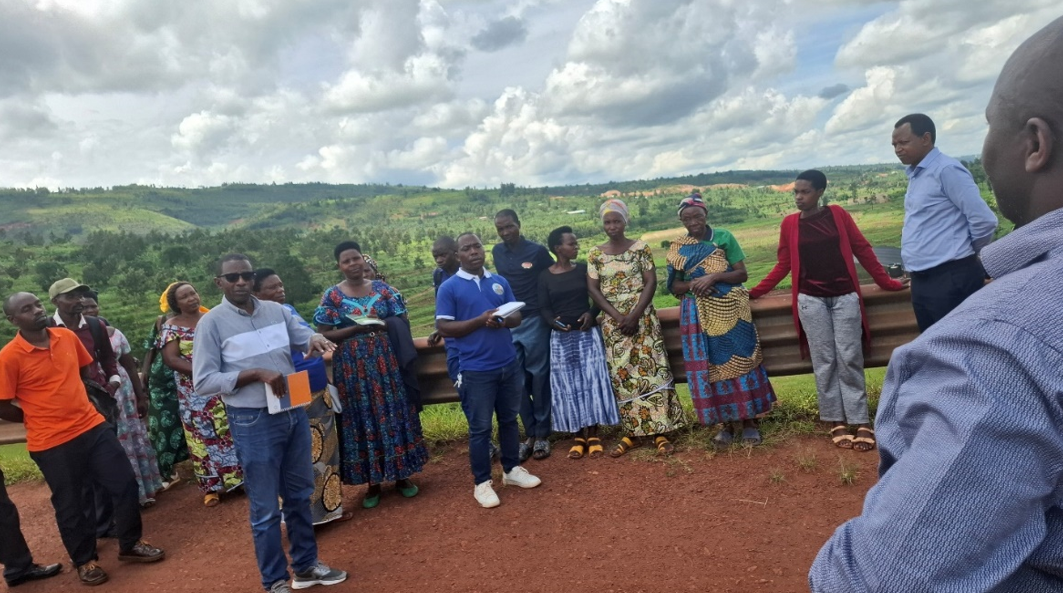
Frame 3: George Ngarambe (left, in glasses) and Fidele (in blue T-shirt) of the Gwiza RW-34 Cooperative explain their partnership to visiting guests.
Empowering the honey sector
The delegation also visited Aux Délices Honey Ltd.; a women-owned company founded in 2016. Beyond producing specialty honeys like moringa and forest blends, it creates cosmetics and candles, while training cooperatives in modern beekeeping.
“The government is finally recognizing our sector. We’re now working on formalizing our national beekeepers’ association,” said Solange Murekezi, company founder and beekeeping advocate.
Despite its potential, Rwanda’s beekeeping sector faces hurdles like poor access to modern hives, limited training, and inadequate market systems. BRAINS is stepping in to train beekeepers in queen rearing, modern practices, and quality assurance.
Sustainable solutions for a resilient future
Across all three sectors—beans, fruit trees, and honey—the BRAINS project and its partners like the Rwanda Agriculture Board (RAB) are supporting farmers with science-backed interventions. These include high-yield, climate-resilient bean varieties; improved fruit tree seedlings and biopesticides; and modern tools and techniques for beekeeping.
Dr. Edouard Rurangwa, Coordinator for Pulses and Oil Crops at RAB, explained: “It’s critical to work with large cooperatives to increase adoption of improved varieties and raise overall bean yields nationwide.”
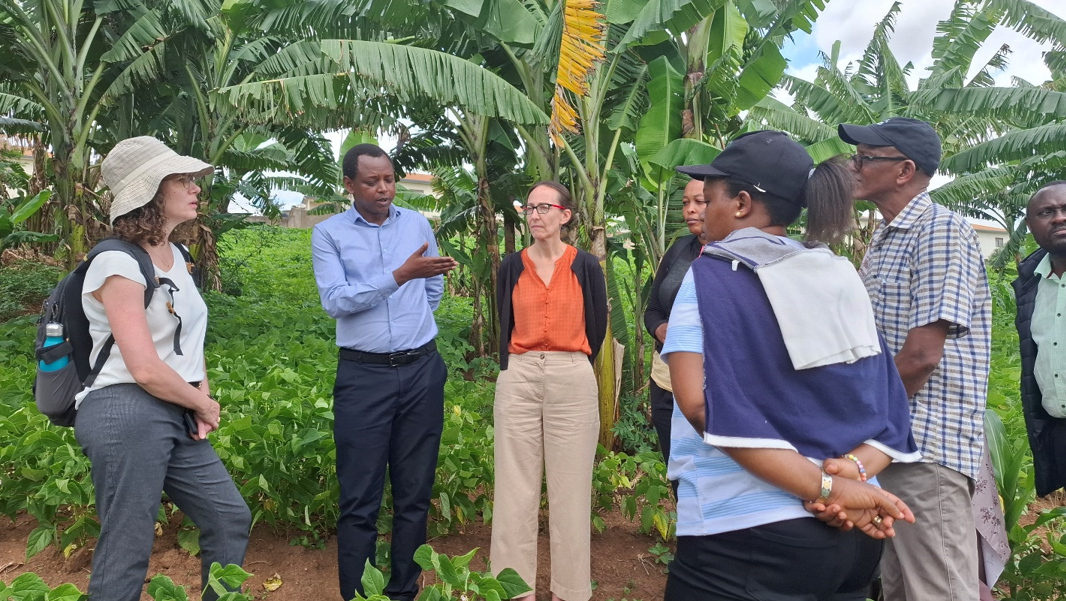
Frame 5: Dr. Edouard Rurangwa from RAB (second left), explaining to the High Commissioner about the bean value chain and collaboration among actors, aggregators and the cooperatives.
The road ahead
As Rwanda navigates a changing climate and growing population, resilient food systems are no longer optional—they are foundational. By integrating beans, fruit trees, and honey into sustainable agricultural systems, Rwanda is not just feeding its people—it’s investing in a healthier, more secure future.
These three value chains, when strengthened, can become the cornerstone of rural prosperity, food security, and environmental stewardship. And through collaborative efforts like BRAINS, Rwanda’s smallholder farmers are learning not just to survive—but to thrive.
[1] NISR, National Accounts 2023/2024
[2] MINAGRI, PSTA5, 2024
______________________________________________________________________________
Frame 1 (Featured/Cover Image): Zaninka Claudine (center), leader of the Abanyamurava Cooperative, with Safina Mukagatera (right), Managing Director of Aggregator Trust Ltd., and a fellow cooperative member on their high-iron bean farm in Kigali.

